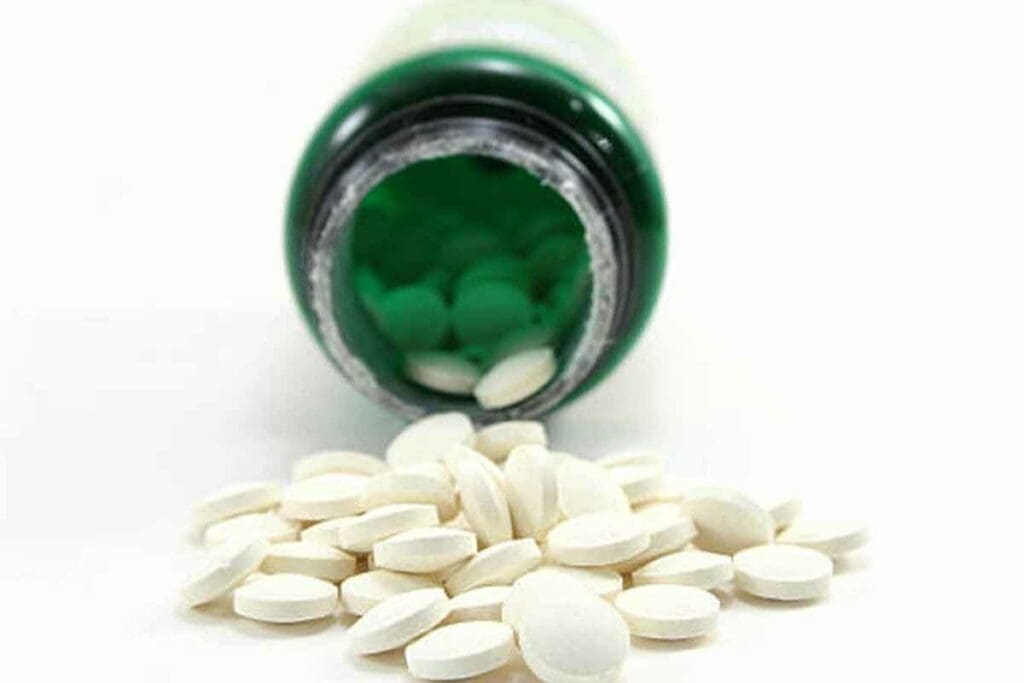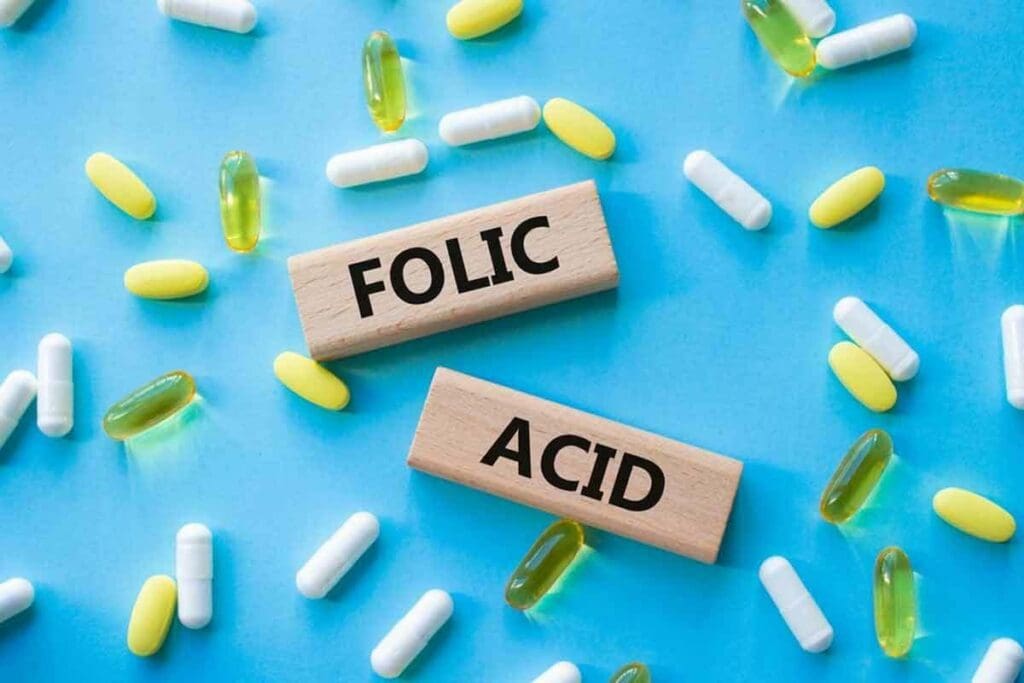Last Updated on November 14, 2025 by Ugurkan Demir

Folic acid is a man-made version of vitamin B9. It helps with cell growth, making DNA, and creating red blood cells. These tasks are key for all women, whether they’re pregnant or not.Explore folic acid benefits for women, from fertility to menopause, supporting energy, blood, and cell health
Folic acid is vital for women’s health at every stage of life, from adolescence to postmenopause. It keeps women healthy and is very important for moms-to-be. But its benefits go beyond pregnancy, helping prevent health problems and boost overall wellness.
Liv Hospital focuses on evidence-based care. They stress the need for folic acid supplements and foods rich in folate in a woman’s diet. Knowing what folic acid does for women helps them make better health choices.

Folic acid is a key nutrient for women’s health. It’s very important for women who might get pregnant, are pregnant, or are in other life stages.
Folic acid is a man-made version of vitamin B9. Folate is the term for all vitamin B9 types, including natural and synthetic forms.
Folic acid is more stable than folate. It’s used in supplements and fortified foods because it keeps its strength better during processing and storage.
The daily folic acid need varies for women. It’s usually between 400 to 800 mcg. Pregnant women need 600 to 800 mcg to help the baby’s brain and spine develop right.
Non-pregnant women should aim for 400 mcg daily. It’s best to talk to a doctor to find out the right amount for you.

Women at every stage of life can greatly benefit from enough folic acid. It supports health and well-being. Folic acid, a B9 vitamin, is key to many bodily functions. These functions are vital for health at all ages.
Folic acid is vital for cellular growth and DNA synthesis. It helps make nucleic acids, which are key to cell division and genetic information. This is essential for tissue repair and growth.
A study shows, “Folate is key for nucleic acid synthesis and DNA repair. It’s vital for cell processes.” (
This highlights folic acid’s role in keeping our genes stable.
Folic acid also plays a big role in red blood cell formation and function. It’s needed for making red blood cells, which carry oxygen. Enough folic acid prevents anemia, which causes fatigue and weakness.
Folic acid’s role in making red blood cells is huge. As mentioned, “Folic acid deficiency can cause megaloblastic anemia. This is when red blood cells are too big and can’t work right.”
In summary, folic acid is essential for women at every age. It supports cell growth, DNA, and red blood cell production. Getting enough through diet or supplements is key to health.
Preventing neural tube defects is a key benefit of folic acid during pregnancy. These defects, like spina bifida and anencephaly, happen when the neural tube doesn’t close properly. Folic acid supplements can greatly lower the risk of these issues.
Folic acid is vital for the fast cell division and growth in fetal development. It makes sure the neural tube, which forms the brain and spinal cord, closes correctly. Studies show that enough folic acid before and during early pregnancy can stop up to 70% of neural tube defects.
Pregnant women are told to take folic acid supplements as part of their prenatal care. This supports fetal development.
The benefits of folic acid during pregnancy go beyond preventing neural tube defects. It also supports overall fetal development, including:
Folic acid fortification of foods has been started in many countries to lower neural tube defects. This involves adding folic acid to foods like flour, rice, and cereals. Research shows that fortification can greatly reduce neural tube defects.
In the United States, fortification has led to a 25-30% decrease in neural tube defects. The global effect of folic acid fortification shows the value of public health efforts in bettering pregnancy outcomes. By knowing the benefits of folic acid and starting fortification programs, countries can lessen the impact of neural tube defects and enhance newborn health worldwide.
Folic acid is key to heart health, helping us stay well for a long time. It lowers the risk of heart disease and stroke. These are big killers around the world.
Folic acid cuts down on homocysteine in our blood. High levels of homocysteine harm blood vessels. This makes them more likely to get blocked.
By lowering homocysteine, folic acid helps prevent heart disease.
Folic acid also helps keep blood vessels healthy. It makes sure they stay flexible and less likely to block. This lowers the chance of stroke.
| Benefit | Description |
| Lowering Homocysteine Levels | Reduces the risk of heart disease by minimizing damage to blood vessels. |
| Stroke Prevention | Maintains blood vessel health, reducing the likelihood of blockages. |
| Overall Heart Health | Contributes to the overall well-being by supporting cardiovascular health. |
In conclusion, folic acid is vital for heart health over time. It helps lower heart disease risk and prevent stroke. This makes it a key nutrient for our overall health.
Folic acid is key in preventing anemia, and it’s very important for women. Folate-deficiency anemia happens when the body lacks folate. This leads to fatigue, weakness, and other health problems.
Folate deficiency shows in many ways, including:
If not treated, folate-deficiency anemia can cause serious health issues. Women with this condition face higher risks of:
Proper folic acid supplements are a simple and effective way to avoid folate-deficiency anemia. By getting enough folic acid, women can lower their risk of getting this condition.
Folic acid supplements do more than just prevent anemia. They also boost energy, help with thinking, and support healthy red blood cells.
Folic Acid Intake Recommendations:
| Life Stage | Recommended Daily Folic Acid Intake |
| Women of childbearing age | 400 mcg |
| Pregnant women | 600-800 mcg |
| Breastfeeding women | 500 mcg |
In summary, keeping folic acid levels up is vital for preventing folate-deficiency anemia in women. By knowing the symptoms and risks of folate deficiency and taking steps to supplement, women can keep their health in check.
Folic acid is not just good for your health; it also keeps your hair, skin, and nails looking great. It helps repair and replace damaged cells. This makes your skin glow and your hair and nails strong.
Folic acid is key to cell regeneration. This process keeps your skin, hair, and nails healthy. It helps by:
The beauty benefits of folic acid are real and backed by science. It helps make DNA and RNA, which are essential for cell growth. This is why it’s so good for your skin, hair, and nails.
Having enough folate is key to fighting early aging. Folic acid lowers homocysteine levels in the blood. High levels can cause oxidative stress and inflammation, which aggravates faster. With enough folate, you can:
In summary, folic acid does more than just keep you healthy. It also makes your hair, skin, and nails look young and vibrant. It supports cell regeneration and fights aging, making you look and feel great.
Unmarried girls and young women can greatly benefit from folic acid. It boosts their health and future reproductive well-being. Folic acid, a B9 vitamin, is key for DNA making, cell division, and red blood cell production.
Folic acid is vital for reproductive health in young women. It helps keep hormones balanced and improves ovulation. This is great for those planning to have kids in the future.
By getting enough folic acid, young women can build a strong reproductive health base. This reduces the chance of pregnancy problems later on.
Key benefits for reproductive health include:
Folic acid is also key for overall growth and development in young women. It helps make DNA and RNA, important for cell growth and repair. This supports tissue growth and repair, keeping young women healthy and full of energy.
Adequate folic acid intake can lead to:
By adding folic acid to their daily routine, unmarried girls and young women can enjoy these benefits. It supports their health and well-being at every stage of life.
Women going through perimenopause and menopause need enough folate. It helps lessen symptoms. Hormonal changes during this time can affect health and well-being.
Folic acid is key to cell growth and DNA replication. As women age, keeping folic acid levels up is vital. It helps manage symptoms of perimenopause and menopause.
Low folate can make hot flashes, mood swings, and fatigue worse. Studies link folate deficiency to higher homocysteine levels. This raises the risk of heart disease in postmenopausal women.
Folate is also important for serotonin, which affects mood. Low serotonin is linked to depression and anxiety, common in menopause. Enough folate can help manage these mental health issues.
Folic acid helps with hormonal changes in perimenopause and menopause. UCLA Health says folic acid is essential for women’s health at all life stages, including post-menopause.
The table below shows folic acid’s benefits during perimenopause and menopause:
| Benefit | Description |
| Regulation of Hormonal Changes | Folic acid helps in balancing estrogen and progesterone levels. |
| Alleviation of Menopausal Symptoms | Adequate folate intake can reduce the severity of hot flashes and mood swings. |
| Support for Mental Health | Folate is essential for serotonin production, helping to manage depression and anxiety. |
In conclusion, keeping folate levels up is key for women in perimenopause and menopause. Knowing how folic acid helps manage symptoms and supports health helps women navigate this transition better.
Women over 50 need folic acid to stay healthy and fight off age-related problems. Folic acid, or vitamin B9, is key to many body functions. It’s very important during this life stage.
Folic acid is vital for keeping the brain sharp and healthy in older adults. Studies show it can slow down brain aging and boost memory in postmenopausal women. This is important for keeping a good quality of life and staying independent.
Adequate folic acid intake can lower the risk of dementia and Alzheimer’s disease. Getting enough folic acid through food or supplements is a simple way to support brain health.
Folic acid also helps with bone density and can prevent osteoporosis. As women get older, the risk of osteoporosis goes up, mainly after menopause. Folic acid, along with other nutrients, helps keep bones strong.
| Nutrient | Role in Bone Health |
| Folic Acid | Supports bone metabolism and density |
| Calcium | Essential for bone structure and strength |
| Vitamin D | Facilitates calcium absorption and bone health |
Folic acid does more than just help with brain and bone health. It also boosts overall vitality in women over 50. It helps make energy, reducing fatigue and anemia, common issues in this age group.
By making sure they get enough folic acid, women can keep their health and well-being up. This improves their quality of life as they get older.
Folic acid is key to health at every life stage. It supports reproductive health and overall well-being. It helps prevent issues like neural tube defects, heart disease, and anemia.
Adding folic acid to your daily routine can greatly improve your life. It supports health and lowers the risk of health problems. This is true during pregnancy and at other life stages, like perimenopause and menopause.
Emphasizing folic acid intake is a smart health move. It aids in cell growth, red blood cell creation, and brain function. Knowing its benefits helps women manage their health and well-being.
Folic acid is good for non-pregnant women in many ways. It helps keep them healthy, lowers heart disease risk, and makes hair, skin, and nails better.
Folic acid is key to women’s health. It helps cells grow, DNA make, and red blood cells form. It’s vital for women’s health and happiness.
Not all women need folic acid supplements. But women who might get pregnant should take it. It helps prevent birth defects and keeps them healthy.
Folate, the natural form of folic acid, is great for women. It boosts energy, nerve health, and heart health. It also lowers the risk of some diseases.
Folic acid lowers homocysteine, a heart disease risk factor. It also keeps blood vessels healthy. This helps the heart stay well.
Folic acid might ease menopause symptoms like hot flashes and mood swings. It helps balance hormones and keeps health in check.
The daily folic acid need varies by age and health. Most women need 400-800 mcg a day.
Folic acid helps keep the brain sharp. It lowers dementia and Alzheimer’s risk. It’s good for brain health.
Folic acid, with other nutrients, is good for bones. It may lower osteoporosis risk, mainly in older women.
Folic acid makes hair, skin, and nails healthy. It helps cells renew and fights early aging signs.
Folic acid is vital for young women and unmarried girls. It supports growth, builds reproductive health, and boosts overall well-being.
Subscribe to our e-newsletter to stay informed about the latest innovations in the world of health and exclusive offers!